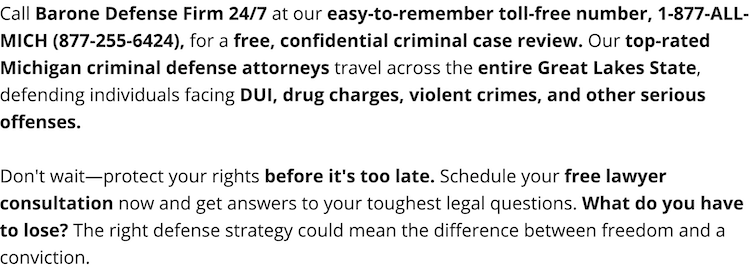Grand Rapids DUI Zero Tolerance Laws
Designed to prevent underage minors from drinking and driving, Michigan Zero Tolerance Laws restrict the amount of alcohol a driver under the age of 21 can have in his or her system. Although the legal blood alcohol content (BAC) level is .08% for drivers over 21, minors can face criminal charges if their BAC is above .02%—consuming alcohol during an approved religious service is the only exception to this rule. The penalties for violating the state's law may include fines, community service, and even jail time making it important a Grand Rapids DUI lawyer is contacted by those accused.
Consequences
If this is your first zero tolerance offense, you may be required to perform up to 360 hours of community service and be fined as much as $250. As a first-time offender, you cannot receive jail time for violating this law. However, if you are convicted of a second zero-tolerance offense within a seven-year period, you may have to spend up to 60 days in jail. Your fine will also increase, now costing twice more ($500) than what a first-time offender would pay.
Once you reach the legal drinking age of 21, any previous zero-tolerance convictions can be used against you if you are charged with another alcohol-related crime. As an example, say you were convicted of violating the zero-tolerance law when you were 18, and now, at age 25, you are arrested for OWI. Although you committed the offense several years ago, the zero-tolerance conviction will count toward Michigan's repeat offender laws. This means you will be treated as a second OWI offender, rather than a first-time offender—and will thus face much harsher penalties.
Defense of a Zero-Tolerance Charge
There are basically two ways to defend a zero-tolerance DUI charge in Michigan. The first is to show that you fit into one of the two exceptions to the rule. The first is that you consumed the alcohol as part of a religious ceremony, and the second is to show that you lawfully consumed the alcohol in Canada.
If you do not fit into either, than winning a zero-tolerance DUI will require successfully attacking the test itself. The first line of attack is to show that the test was not properly requested. If this defense is not available, then your attorney will need to show that the test result is otherwise not admissible. This can occur when the police don't follow their training in collecting the breath or blood test. Finally, your lawyer might show that the circumstances under which the test was given impacted the reliability of the result, that the testing equipment itself was flawed or that you are not a proper subject for breath or blood testing.
Speaking With an Attorney
If you were charged with violating Michigan's Zero Tolerance Law, it is important for you to speak with an experienced OWI attorney. The consequences of a zero-tolerance conviction will impact your life long after you have served your sentence. Do not let one youthful mistake jeopardize your future. Contact attorney Patrick T. Barone to learn more about how Michigan's zero tolerance laws affect you. With over 30 years of experience in OWI defense, Mr. Barone has the knowledge and skill to handle your case. Call now for your free consultation.
 Barone Defense Firm Home
Barone Defense Firm Home
















